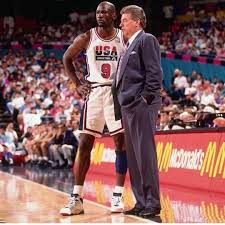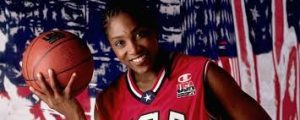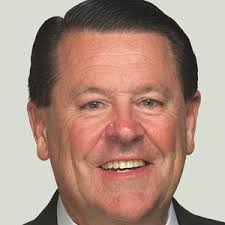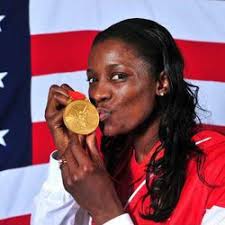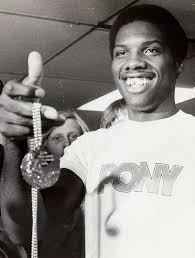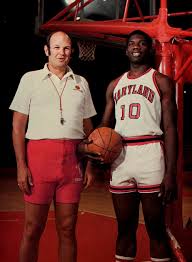The NBA Finals date back to 1947 (when they were known as the Basketball Association of America Finals) and the very 1st NCAA tourney was held in 1939. Olympic basketball competition is even older: it debuted as a demonstration event in 1904 and the men’s version became a medal sport in 1936, with the women finally getting their chance to go for the gold in 1976. The United States has dominated Olympic basketball competition from the start: the men have won 15 gold medals in the 18 tournaments they have participated in during the past 84 years, while the women have won 8 gold medals in the 10 tournaments in which they have competed during the past 44 years. Those of you who were looking forward to the 2020 Olympics opening ceremonies in Tokyo on July 24, 2020 will have to wait an extra 364 days, as the coronavirus caused a postponement until July 23, 2021. Due to the absence of college basketball since mid-March, HoopsHD’s Jon Teitel decided to fill the void by trying to interview as many prior Olympic players/coaches as possible so that you have something to read this summer while not watching the Summer Games. We continue our coverage by chatting with Jennifer Azzi about winning an NCAA title in 1990 and a gold medal in 1996. Today marks the 24th anniversary of her scoring 3 PTS in her 1996 Olympic debut in a win over Cuba in round-robin pool play.
You grew up in Tennessee: what made you choose Stanford? It is obviously a great academic school but I really did not know much about Stanford at all. Back then it was not known as a basketball school by any means, and when I started getting letters from Stanford my mom (a teacher) and dad were both very excited and really encouraged me to take a leap of faith. It was Coach Tara VanDerveer’s 1st year so we were her 1st recruiting class. They really believed in her vision and kind of helped me see that as well. I was looking at Stanford like, “Well, they are terrible, but I love basketball”. I also saw it as an opportunity to play right away, be part of something special, and build a program.
In the 1989 NCAA tourney you set a record with 9-11 3PM, and your 45.2 career 3P% remains among the best in NCAA history: what is the key to making shots from behind the arc? Shooting a lot, no kidding. It is about getting up a lot of reps and practice, practice, practice.
Take me through the magical 1990 NCAA tourney title game in Knoxville: It was interesting because Tennessee was supposed to be there but they got beat by Virginia. We played Virginia in the semifinals, which was a really good thing for us. It was sold out with 20,000 fans and thank God that Tennessee was not there: not that we could not have beaten them but it set a very different vibe. For 4 years, but certainly during my senior year, our mission was to win a championship: period. Everything we did, talked about, and ate: all of it was going towards winning a championship. When you get into that final game you do not really know how you are going to feel. I remember being very nervous talking to assistant coach Julie Plank but she said, “Hey, if you are nervous then just look at your teammates because they really need you”. That kind of snapped me out of it: once we all got out on the court it was like everything that we had worked for finally started to come true. We were knocking down shots, making stops, playing together, and ended up with a fantastic game against Auburn in the finals. I do not want to say that it was meant to be, but it was almost like we knew that we were going to win…and the winning started long before that moment.
What was it like to play 20 miles from your hometown of Oak Ridge in front of 20,000+ people (which at the time was the largest crowd to ever watch a women’s basketball game)? It was surreal. I kind of became the “Tennessee player” because the Volunteers were out of the tournament. We probably had more fans in the building than Auburn did just because I was from Oak Ridge, which is just down the street. A lot of the town came to the game so it was an exciting environment.
You scored 16 PTS in a 7-PT win over Auburn to clinch the title, win tourney MOP, and finish 32-1: how close did you come to going undefeated, and what did it mean to you to win a title? We were so close. When we played Washington at home we beat them by around 40 PTS, then went up to Washington a week or 2 later and we lost by 3 PTS. However, it was the best thing that ended up happening to us. It was better to lose that game and realize, “Hey, we are not above being beaten if we are not doing things correctly”, so I think that we learned a lot from that loss. You hate it when it is actually happening but then it ends up being the best thing for you in hindsight.
You were a 2-time All-American and 1990 national POY: what did it mean to you to win such outstanding honors? It never meant anything: not to be rude to the people that give out awards but basketball is all about the team. I think that the greatest joy in the sport is when you are a great teammate and when you make each other better and then build a team and are successful together. Even as a coach, 1 of the hardest things for me to get players to understand is that it is not about them but rather about our team’s success. We all had that during my senior year: we were all 100% about the team.
You graduated as the Cardinal’s all-time leader in both AST (751) and STL (271): what is the key to being a great PG? You have to be a giver and understand how everyone else on the court is thinking/feeling. You certainly have to know the game and have the skill set to do it, but I think to be really good at it you have to understand people. I think that was a strength of mine that I did not fully understand until I started coaching. There were some things that I did naturally that I had to sometimes teach people after becoming a coach. When I see the natural people skills in someone, I think they have a chance to become a really good PG.
After going 52-0 in the lead-up to the 1996 Olympics you went 8-0 with team USA in Atlanta: what did it mean to you to win a gold medal? It is not unlike winning a national championship because you work for a long period of time to get there. The 1992 Olympic team won a bronze medal so USA Basketball paid us all to stay home and train together for 18 months leading up to the 1996 Olympics. They could cut any of us at any point so when you have an Olympic gold medal hanging over someone’s head you know that everybody is going to be doing all the right things (including workouts) while they are away! There was great accountability to work hard during that 18 months. We certainly had the best athletes and the best overall basketball players but I do not think that we had the best team chemistry at the 1992 Games (or even at the 1994 World Championship game) so it was a big deal that everybody really, really was 100% committed.
You played pro basketball for several years both in the US and abroad: what is the biggest difference between basketball in the US vs. basketball overseas? International basketball takes place during a different season so you can play the regular basketball season there and then join the WNBA during the summer. Obviously playing over here you get a chance to play with both Americans as well as players from other countries, but when you play overseas a lot of times you are limited to just 2 Americans per team so you do not always know what you are getting. It has to be a really good organization. Both were great experiences but for different reasons: to be able to play in the US was a dream come true for all of us who did not grow up with that.
In 2000 as a member of the Utah Starzz you led the WNBA with 93 FT%: what is your secret for making FTs? I stayed after practice throughout my professional career: I shot all the time. I do not think there is any other key: if you shoot a lot then you can become a good shooter. However, I broke my hand at the beginning of that season and was out for 6 weeks, which was bad because the season is not that long. I remember the very 1st game that I played: I was just praying at the free throw line that the ball would get to the basket because I was coming back from a broken hand. I also learned the importance of the power of your mind, but only in combination with the work behind it. I had been shooting forever so I did not necessarily need all of the reps that I had taken in the past. If you have done it enough then your body will remember how to do it even if you step away from it. I know it is a cliché but it really is like riding a bike: you could go 10 years without riding a bike and then get on a bike and be able to ride it. However, if you want to always be good at it then you always have to do it. Steph Curry is always in the gym and the guy is an amazing shooter. I think that being in the gym a lot and shooting a lot keeps your mind right. The day before a game I would take around 1000 shots, which keeps it fresh. You do have to go get a lot of reps up. I tell players that they have to get bored to get better: you really have to shoot a lot if you want to become a good shooter.
In 2009 you were inducted into the Women’s Basketball Hall of Fame: where does that rank among the highlights of your career? I am glad that we have a Women’s Hall of Fame: it puts the game in a really good place and is a great way to honor the game and all of the wonderful people who were part of it. However, it is kind of an individual award. I am appreciative of it and I think it is great, but at the same time I feel like it is also a product of all the great players/coaches/experiences that I had in the game.
You spent 6 years as head coach of the women’s basketball team at San Francisco: how did you like the job, and what do you hope to do in the future? Being able to teach all of the things that I have learned gives me great satisfaction. I think that coaches are teachers so to be able to help our team get better brought me a lot of joy. Just the same as when I was playing, I think what drives me is improvement. It is a constant: I told our team all the time that until you stop playing you never arrive. There is always something else to get better at. The better you get, the more you want to try something different and continue to push yourself and grow. I think that players have to be receptive too: I can tell them that if they want to play professionally then here is the road map…but it is still up to them to physically do it. I think sometimes that is a challenge in coaching: you know what it takes but you are not the 1 doing it. You are trying to get someone to do things that you did or try something different, but fundamentally your success comes through other people’s motivation. That can be really challenging at times, especially for someone who is highly motivated, but when you have players who want to be really good it is exciting. It has been interesting to have this career path because basketball has provided me with so many opportunities. I would love to stay involved in the game no matter what because it is such a great game. I have had great experiences working with the NBA and some other things before coming to USF so who knows what the future holds, but basketball will always be somewhere in there.


